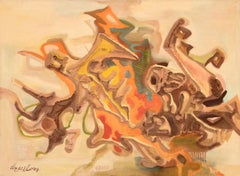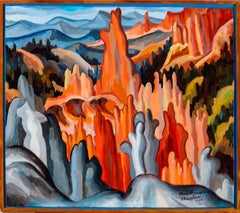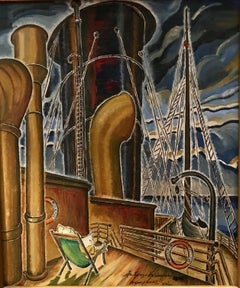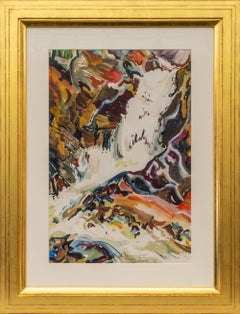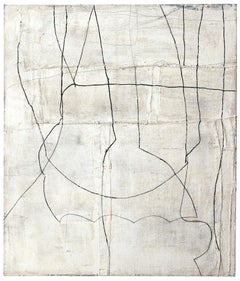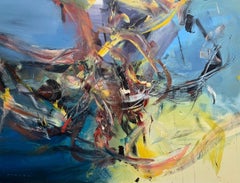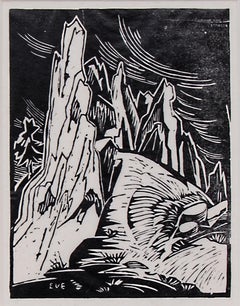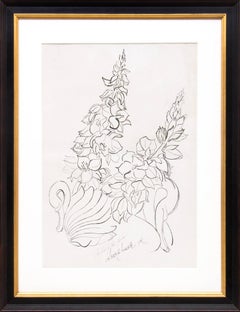Eve Drewelowe Art
American, 1899-1989
From her earliest memory, Eve Drewelowe wanted to be an artist, and she became the first student to receive a masters of fine arts from the University of Iowa. After graduation, she went with her new husband to Boulder, Colorado, where she soon found herself in the role of dean’s wife. Eventually that responsibility and its “chores” proved to be too restrictive. After a health crisis, Drewelowe had a self-described “reincarnation” in which she resolved to make a place for her creativity. Naturally effusive, she yet valued being alone, and her strong feelings for life were expressed in her exuberant paintings. Growing up on an Iowa farm, Drewelowe developed a love for the land from her “environmentalist” father, who died when she was eleven. Subsequently, The Dean of the Graduate School at Iowa served as a father-figure when he facilitated her entry into the graduate program in art. Seemingly skeptical, Carl Seashore secretly wanted the young woman to “establish a first in the history of art training across the nation,” as the artist would later reminisce. Drewelowe graduated in 1924, and she later was a benefactor of what became one of the nation’s leading college art programs.
At college, Drewelowe met and married a political science student, Jacob van Ek. Accepting a teaching position at the University of Colorado, van Ek moved to Boulder with his bride, who pursued her interest by helping found the Boulder Artists’ Guild. In 1928-1929, they traveled around the world to twenty-three countries for thirteen months, during which Drewelowe filled seven sketchbooks. With her husband now a dean, she threw herself into remodeling their house, a domestically acceptable creative project. Balancing her art and her duties as a dean’s wife, Drewelowe felt increasing frustration, and her health began to suffer. In the catalogue of a 1988 retrospective, she gave voice to her desire for self-determination: “Housewife! What an odious word! First! Foremost! Always! My waking thought from an embryo was on my need to be an artist!” Traveling to New York for her second solo exhibition in 1940, she stopped at the Mayo Clinic, where she was diagnosed as having a gastric polyp. This experience led to a new dedication to her painting, a complete turnaround in which she called her “reincarnation.” Inspired by the Rocky Mountains, she painted animated landscapes that pulsated with energy -- as if still in motion from generative forces. With a rainbow palette, Drewelowe created visionary scenes by intensifying colors in lively, rippling patterns.
©David Cook Galleries, LLCto
2
1
1
1
1
Overall Width
to
Overall Height
to
4
2
1
2
1
2
2
1
1
1
4
3
1
1
1
4
10,223
2,785
2,504
1,384
4
2
4
Artist: Eve Drewelowe
Alpha – The Beginning by Eve Drewelowe, 1950s Mid-Century Modern Abstract
By Eve Drewelowe
Located in Denver, CO
“Alpha – The Beginning” is a vibrant and expressive 1950s abstract oil painting by renowned Colorado modernist Eve Drewelowe (1899–1989). This dynamic mid-century modern composition ...
Category
Mid-20th Century Abstract Eve Drewelowe Art
Materials
Mixed Media, Oil
$1,795 Sale Price
72% Off
"Stardust Sculpture" (Little Bryce, Utah)
By Eve Drewelowe
Located in Lambertville, NJ
Jim's of Lambertville Fine Art Gallery is proud to present this piece by Eve Drewelowe (1899 - 1988).
Landscape painter, Eve Drewelowe, was the eighth of thirteen children born in ...
Category
1930s Eve Drewelowe Art
Materials
Oil, Board
"Arcturus, Helsing" Modern Oil Painting WPA American Scene Denver Historical Art
By Eve Drewelowe
Located in New York, NY
"Arcturus, Helsingfors," 19 x 16 inches, oil on canvas, signed, titled and dated 1935, 33/30C lower right.
Provenance: Acquired from the personal collection of Jim Elkind (Lost City Arts) who acquired it from interior designer Jay Spector. Graham Gallery label on verso.
Born in New Hampton, Iowa, Eve Drewelowe graduated from Hampton High School in 1919 and then studied at the University of Iowa...
Category
1930s American Modern Eve Drewelowe Art
Materials
Oil
Modernist 1945 Abstract Waterfall Watercolor Landscape Painting by Eve Drewelowe
By Eve Drewelowe
Located in Denver, CO
This striking 1945 abstract landscape watercolor by pioneering modernist artist Eve (Van Ek) Drewelowe, titled "The Champagne Cascades, Crescendos, Crashes," is a bold interpretation...
Category
1940s American Modern Eve Drewelowe Art
Materials
Watercolor
$13,500 Sale Price
22% Off
Related Items
Rick Lewis - The Parade, Painting 2023
By Rick Lewis
Located in Stamford, CT
The Parade
Oil, bitumen, graphite, marble powder, burlap on canvas
72" X 60"
I am a visual artist whose work investigates small and large -scale abstraction primarily in the medium ...
Category
2010s Abstract Eve Drewelowe Art
Materials
Marble
"Symphony" - Stunning Dynamic Abstract Expressionist Painting in Cool Palette
By Masri Hayssam
Located in Carmel, CA
Masri Hayssam (Lebanese, Italian, born 1965)
"Symphony" 2019
Oil Paint, Acrylic Paint, Mixed Media, Canvas, Stretcher Bars
The artist signed the bottom left and the back of the paint...
Category
2010s Abstract Expressionist Eve Drewelowe Art
Materials
Canvas, Mixed Media, Oil, Acrylic, Stretcher Bars
$19,200
H 36 in W 48 in D 1.5 in
1950s "View from the Window" Jack Hooper Mid Century Still Life Oil Painting
By Jack Hooper
Located in Arp, TX
Jack Hooper
"View From the Window"
c. 1950s
Oil on Canvas
32"x25.25" silver and black wood frame 26.5"x33.25"
Unsigned
Minor wear consistent with age and ...
Category
Mid-20th Century American Modern Eve Drewelowe Art
Materials
Canvas, Oil
$1,750 Sale Price
50% Off
H 26.5 in W 33.25 in
1955 View of Ajax Mountain in Aspen, Colorado by Artist Harold Haydon
By Harold Haydon
Located in Chicago, IL
A small, vibrant 1950s Mid-Century Modern mountain landscape painting depicting Aspen, Colorado by famed Chicago artist Harold Haydon. Titled "Western Vi...
Category
1950s American Modern Eve Drewelowe Art
Materials
Oil, Board
$850
H 10.75 in W 11.75 in
Vintage American Modernist Framed Abstract Expressionist Beach Scene Painting
Located in Buffalo, NY
Vintage abstract beach scene oil painting. Oil on canvas. Framed. Signed. In excellent original condition. Handsomely framed in a wood molding. Excellent condition, ready to han...
Category
1950s Abstract Eve Drewelowe Art
Materials
Oil, Board
$1,275
H 25 in W 32 in D 2 in
Antique American Abstract Expressionist Gold Giltwood Framed Oil Painting
Located in Buffalo, NY
Vintage abstract oil painting. Oil on board. Signed verso. Framed. In excellent original condition. Handsomely framed in a wood molding. Excellent condition, ready to hang and ...
Category
1960s Abstract Eve Drewelowe Art
Materials
Oil, Board
$875
H 11 in W 12 in D 2 in
Contemporary Abstract Expressionist Painting with Found Object Collage
By Michael Pauker
Located in Soquel, CA
Lively abstract expressionist oil painting/collage of what resembles a corridor as the focal point, with imported cigar cut outs and pops of vibrant color by...
Category
21st Century and Contemporary Abstract Expressionist Eve Drewelowe Art
Materials
Canvas, Mixed Media, Oil
$3,350
H 36 in W 48 in D 1 in
Caribbean Sea - Original Textured Blue Tone Abstract Landscape Artwork Framed
By Frederic Paul
Located in Los Angeles, CA
The delicate and poetic artworks of painter Frederic Paul reference his Asian roots in expressive and elaborate compositions. Inspired by the bold colors, spices, flora, and landscap...
Category
2010s Abstract Eve Drewelowe Art
Materials
Canvas, Mixed Media, Oil, Acrylic, Rice Paper
City at Night (Cityscape)
By Abram Tromka
Located in Wilton Manors, FL
Abram Tromka (1895-1964)
City at Night, ca. 1940.
Oil on canvas, 16 x 20 inches; 20 x 24 inches in antique oak frame. Signed lower right.
Frame is of the period, but probably not ...
Category
1930s American Modern Eve Drewelowe Art
Materials
Canvas, Oil
Plein Air American Oil Painting Rainstorm Signed Original Modern Impressionist
Located in Buffalo, NY
nknown Artist (Signed “Kaufman”)
Untitled (Pastoral Horizon), mid-20th century
Oil on board
Framed dimensions: 25 in. H × 21 in. W
Original cream-toned carved wood frame
This expres...
Category
1920s American Modern Eve Drewelowe Art
Materials
Masonite, Oil
$1,850
H 21 in W 25 in
American School Summer Wildflowers and Meadow Path Impressionist Oil Painting
Located in Buffalo, NY
A radiant Impressionist-style landscape, this oil painting captures the vibrant warmth of a summer meadow scattered with white daisies and blush-pink wildflowers. Loose, expressive b...
Category
1940s Impressionist Eve Drewelowe Art
Materials
Oil, Board
$675
H 14 in W 20 in D 1 in
Still Life of Peaches, Mid Century Mondern
Located in Grand Rapids, MI
American, 20th Century
Signed: Klug '67 (Right, Center)
" Still Life of Peaches ", 1967
Oil on Masonite
24" x 30"
House in a 3 1/2" Frame with a 1" Linen Liner
Overall Size:...
Category
Mid-20th Century American Modern Eve Drewelowe Art
Materials
Masonite, Oil
Previously Available Items
Red Rocks - Boulder, Colorado
By Eve Drewelowe
Located in Denver, CO
Red Rocks - Boulder, Colorado, an original signed framed black and white woodblock (woodcut) by Colorado modernist woman artist, Eve Drewelowe (1899-1989). Presented in a custom frame with all archival materials and UV protectant glass, outer dimensions measure 17 ½ x 14 ½ x ¾ inches. Image size is 6 ¾ x 5 ¼ inches.
Provenance: Private Collection Denver, Colorado
Referenced in: "Eve Drewelowe" by Eve Drewelowe & Wallace Tomasini:, 1988, Page 77, #348:
A painter and sculptor, Eve Drewelowe (Van Ek) was the eighth of twelve children and grew up on a farm with a tomboyish spirit. Her farm duties did not permit her to take art classes in her youth that she later felt would have hindered the development of her artistic style. Although her father died when she was eleven, he imparted to her reverence for nature and a true love of the earth, values later reflected in her western oil and watercolor landscapes.
She attended the University of Iowa at Iowa City on scholarship, receiving her B.A. degree in graphic and plastic arts in 1923. After graduation and against the advice of her art professor, Charles Atherton Cumming who believed that matrimony ended a woman’s painting career, she married fellow student Jacob Van Ek. While he pursued his doctorate in political science, she enrolled in graduate school at the University of Iowa for her M.A. degree in painting and the history of art. At that time her alma mater was one of the few universities in the United States offering an advanced fine arts degree, and she was its first graduate, receiving her degree in 1924.
That year the Van Eks moved to Boulder, Colorado, where Jacob had obtained a position as an assistant professor at the University of Colorado. Five years later he became the Dean of the College of Arts & Sciences, a position he held until 1959. Eve briefly studied at the University. In 1927 and 1928 she taught part-time at the University’s School of Engineering and a decade later summer courses (1936 and 1937) in the University’s Department of Fine Arts.
In 1926 she became a charter member of the Boulder Artists Guild and participated in its inaugural exhibition. Like many American artists of her generation, she helped foster an art tradition outside the established cultural centers in the East and Midwest. Her professional career spanning six decades largely was spent in and around Boulder. There she produced more than 1,000 works of art in oil, watercolor, pen and ink and other media in styles of impressionism, regionalism, and abstraction.
She devoted a considerable part of her work to Colorado, Wyoming and Arizona subject matter depicting colorful and fantastic landscapes pulsating with energy and untouched by humans. Excited by what she saw, the wide open spaces made her feel like a modern-day pioneer. In discussing her work, she once said, "What really motivated me in my youth, in my growth, in maturity was my desire to captivate everything. I put on canvas an eagerness to possess the wonder of nature and beauty of color and line - to encompass everything, not to let anything escape."
Before World War II she and her husband took two international trips that had far-reaching consequences for her career, exposing her to the arts and cultures of countries in Asia and Europe. The first in 1928-29 was an extensive excursion in the Far East for which her husband had received a scholarship to study and report on the socioeconomics of Japan, Korea, China, the Philippines, the Dutch East Indies and India. The year after their return she had her first solo show at the University of Colorado’s library gallery. Discussing the twenty-six oils and sixteen ink drawings on view representing sixteen different countries, the Christian Science Monitor reviewer noted: "The pictures have a wide range and are far from being stereotyped in subject matter, being personal in choice. The ink-brush drawings are spontaneous, well balanced, and striking in their masses, giving the sense of having been done on the spot."
Her second trip with her husband and a party from the Bureau of University Travel had a four-month itinerary that included England, Denmark, Finland, Russia, Turkey, Greece Italy and France. It yielded seventeen oils and twenty-six ink-wash drawings which she exhibited in a February 1936 solo show at the Boulder Art Association Gallery. Her creative output in the 1930s attracted the attention of the critic for the Parisian Revue des Arts whose observations were translated and printed in the Boulder Daily Camera on June 10, 1937:
To present our readers Eve Van Ek [at that time she signed her work with her married name] - is to give them an opportunity to admire a talent of multiple aspects. The eclecticism of her art passes from a rich skill in forceful oil painting of fine strokes of precision best seen perhaps in her treatment of mountain subjects, of craggy cliffs hewn as in nature, through pen and ink or lithographic crayon design, water color, and occasionally embroidery and sculpture, to the delicate perfection of detail of the miniature. The lofty mountains of Colorado have supplied her with extremely interesting subjects for study; she knows how to represent in an entirely personal way the varying scenes and the curious restlessness of the terrain.
While pursuing her art, she also was a dean’s wife. The responsibilities attached to that position proved too restrictive, contributing to a grave illness. She underwent an operation in 1940 at the Mayo Clinic for a gastric polyp, a dangerous procedure at that time. Although she had expected to come back to Boulder "in a box," the surgery proved successful. Depicting her painful hospital stay in a watercolor, Reincarnation, she reflected on the transformative experience of piecing her life back together. That October she received encouragement from the review of her solo exhibition at the Argent Gallery in New York written by Howard Devree, art critic for the New York Times who said: "The whole exhibition is stimulating…Boats, fences and even flowers in the canvases of Eve Van Ek…seem struggling endlessly to escape from the confines of the frame."
Her watercolor, Crosses, Central City (1940), illustrates her work described in the New York review. The composition pulsates with energy conveyed by the modernist technique of juxtaposing the scene’s various angles, distorting the shapes and positions of the structures, additionally highlighting them with bright colors. The telephone poles at various angles represent crosses figuratively marking a Way of the Cross symbolized by the wooden stairs...
Category
Mid-20th Century American Modern Eve Drewelowe Art
Materials
Woodcut
The Yodel of the Yucca
By Eve Drewelowe
Located in Denver, CO
Acrylic on laminated cloth paper. Housed in a custom frame with all archival materials, outer dimensions measure 27 ¾ x 36 x 1 ½ inches. Image size is 27 x 18 ¾ inches.
From her e...
Category
Mid-20th Century American Modern Eve Drewelowe Art
Materials
Acrylic
Eve Drewelowe art for sale on 1stDibs.
Find a wide variety of authentic Eve Drewelowe art available for sale on 1stDibs. If you’re browsing the collection of art to introduce a pop of color in a neutral corner of your living room or bedroom, you can find work that includes elements of orange and other colors. You can also browse by medium to find art by Eve Drewelowe in paint, oil paint, board and more. Much of the original work by this artist or collective was created during the 20th century and is mostly associated with the abstract style. Not every interior allows for large Eve Drewelowe art, so small editions measuring 21 inches across are available. Customers who are interested in this artist might also find the work of Charles Green Shaw, Michael Goldberg, and Syd Solomon. Eve Drewelowe art prices can differ depending upon medium, time period and other attributes. On 1stDibs, the price for these items starts at $1,795 and tops out at $74,375, while the average work can sell for $23,750.
